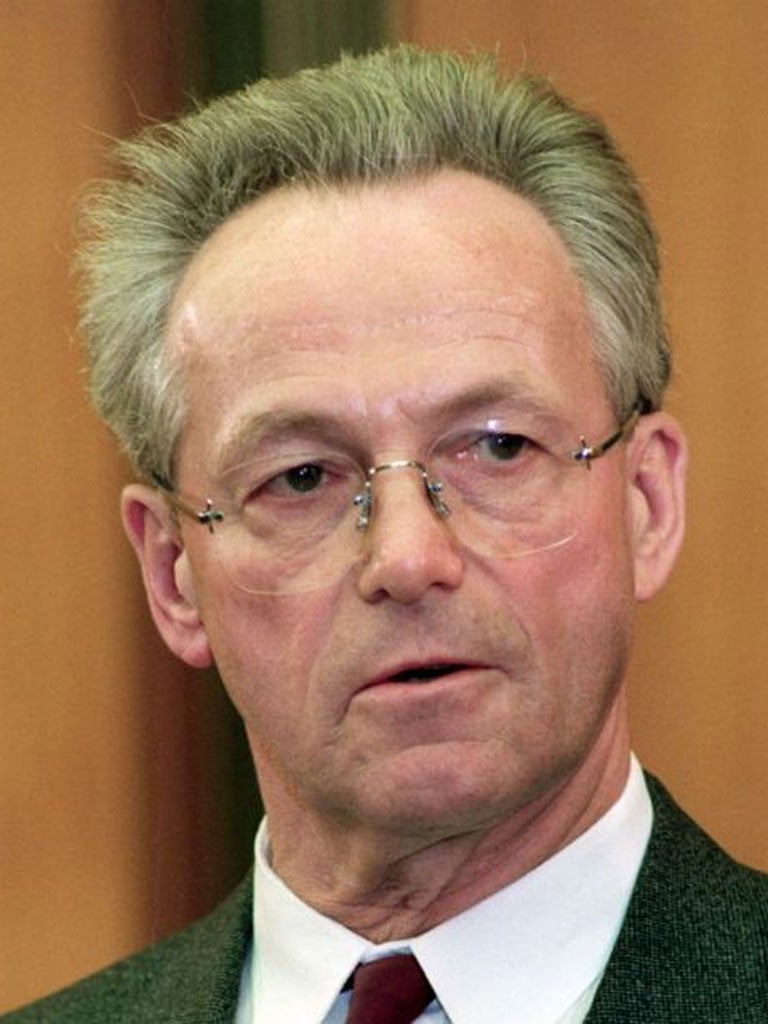Manfred Gerlach: Last head of state of East Germany

Manfred Gerlach served from 6 December 1989 until March 1990 as the head of state of East Germany, the German Democratic Republic (GDR). He had replaced the last Communist to hold the post, Egon Krenz, who had only held it from 24 October.
In between, the Berlin Wall had been opened on 9 November and mass demonstrations were taking place all over the GDR. Gerlach was considered acceptable to the reformist wing of the ruling Socialist Unity Party (SED). Influenced by Gorbachev in the Soviet Union, and growing discontent in the GDR, Gerlach had caused a stir when, on 13 October 1989, he called into question the leading role of the ruling SED. Few had expected this, because for most of his career he had played a willing part in the pseudo-democracy of Communist-dominated East Germany. He led the so-called Liberal Democratic Party of Germany (LDPD) from 1954 to February 1990.
Gerlach was born in Leipzig on 8 May 1928, the son of a skilled engineering worker. After attending local schools he got work as a legal clerk. In 1943, he founded an illegal anti-Nazi youth group. He was subsequently arrested, in March 1944, and was lucky he escaped a death sentence. On his 17th birthday, the Germans signed the unconditional surrender. The Americans had occupied Leipzig in the previous month, remaining until July when the Soviets took over. He was reinstated in his post and became a founding member of the Free German Youth and the LDPD.
By 1948 it was clear that the LDPD and the other non-communist parties would be subject to the leading role of the SED. Some of the top members of the LDPD fled to West Germany, but Gerlach stayed on, gaining rapid promotion. When the East German state was established in 1949 he became, aged 21, a member of the Volkskammer, the parliament. From 1951 to 1954 he studied law at the German Academy of State Sciences and Law. In 1964 he was awarded a doctorate.
As general secretary of the LDPD, from 1954, Gerlach was de facto party leader. Between 1967 and 1990 he was its chairman. His party was one of four satellite parties – Christian Democrats, the Farmers Party and the National Democrats were the others – “elected” to the GDR parliament in the non-competitive elections. Like the other leaders, he was a member of the Council of State, in theory the collective head of state. Their task internally was to reconcile the remnants of the middle and professional classes and Christians to the regime. Externally, the job was to cultivate relations with non-communist parties in Western countries, including NATO states. Among Gerlach’s targets were the British Liberal Party and the West German Free Democrats. Contacts with Western peace groups and Christians were also sought.
Gerlach served the communist leaders Walter Ulbricht and then, from 1971, Erich Honecker loyally, whatever the twists and turns of policy. They in turn implemented the wishes of the men in Moscow – Stalin, Malenkov, Khrushchev, Brezhnev, Andropov and Chernenko – in the GDR. The trouble started when Mikhail Gorbachev took over as General Secretary of the Soviet Communist Party in 1985 and introduced glasnost and perestroika. Increasingly, East German reformers expected their leaders to follow Gorbachev, but they did not. Gerlach’s questioning of the SED’s leading role was therefore surprising.
Before the first free elections of March 1990, in the GDR, Gerlach’s party merged with two others to become the BFD. With a new leader it attracted 5.3 per cent. The Christian Democrats, blessed by West German Chancellor Helmut Kohl, gained 40.8 per cent, the Social Democrats 21.8 and the renamed Communists 16.4. Christian Democrat Sabine Bergmann-Pohl was elected president of the new Volkskammer and thus replaced Gerlach as head of state. His party fused with the West German Free Democratic Party (FDP).
In 1992 Gerlach was accused of having denounced several LDPD members to the Soviets in 1947. In November 1993 he gave up his membership of the FDP after it appeared he would be expelled. He died in Berlin after a long illness.
Manfred Gerlach, politician: born Leipzig 8 May 1928; died Berlin 17 October 2011.
Join our commenting forum
Join thought-provoking conversations, follow other Independent readers and see their replies
0Comments